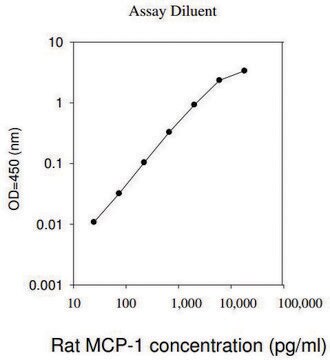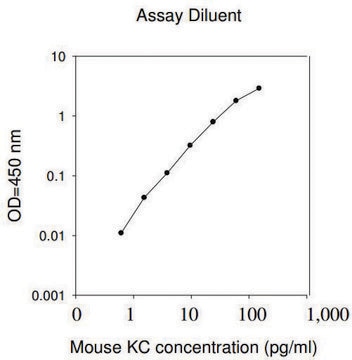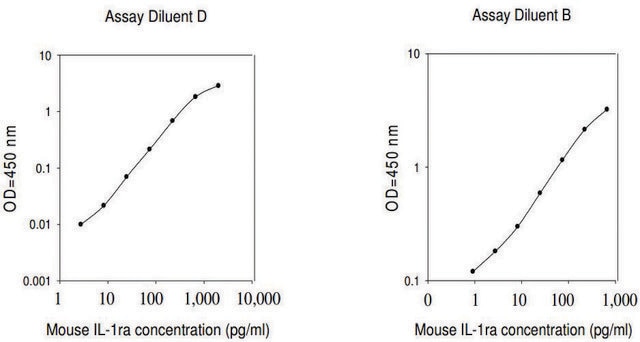RAB0056
Mouse MCP-1 / CCL2 ELISA Kit
for cell and tissue lysates
Sign Into View Organizational & Contract Pricing
All Photos(2)
About This Item
UNSPSC Code:
41116158
NACRES:
NA.32
Recommended Products
species reactivity
mouse
packaging
kit of 96 wells (12 strips x 8 wells)
technique(s)
ELISA: suitable
capture ELISA: suitable
input
sample type cell lysate
sample type tissue lysate
assay range
inter-assay cv: <12%
intra-assay cv: <10%
sensitivity: 3 pg/mL
standard curve range: 2.74-2000 pg/mL
detection method
colorimetric
shipped in
wet ice
storage temp.
−20°C
Gene Information
mouse ... Ccl2(20296)
General description
Monocyte chemotactic protein-1 (MCP-1)/C-C motif chemokine ligand 2 (CCL2) is a cytokine, which plays a major role in recruiting macrophages. It is essential for the development of wound healing stages. CCL2 participates in angiogenesis.
The Mouse MCP-1 ELISA (Enzyme-Linked Immunosorbent Assay) kit is an in vitro enzyme-linked immunosorbent assay for the quantitative measurement of mouse MCP-1 cell lysate and tissue lysate.
Immunogen
Recombinant Mouse MCP1
Application
For research use only. Not for use in diagnostic procedures.
Please refer to the attached General ELISA KIT Procedure (sandwich, competitive & Indirect ELISA)
Please refer to the attached General ELISA KIT Procedure (sandwich, competitive & Indirect ELISA)
Other Notes
A sample Certificate of Analysis is available for this product.
Please type the word sample in the text box provided for lot number.
Please type the word sample in the text box provided for lot number.
Kit Components Also Available Separately
Product No.
Description
SDS
Signal Word
Warning
Hazard Statements
Precautionary Statements
Hazard Classifications
Met. Corr. 1
Storage Class Code
8A - Combustible corrosive hazardous materials
Choose from one of the most recent versions:
Already Own This Product?
Find documentation for the products that you have recently purchased in the Document Library.
Fernando J Barreyro et al.
Liver international : official journal of the International Association for the Study of the Liver, 35(3), 953-966 (2014-04-23)
Hepatocyte apoptosis, the hallmark of non-alcoholic steatohepatitis (NASH) contributes to liver injury and fibrosis. Although, both the intrinsic and extrinsic apoptotic pathways are involved in the pathogenesis of NASH, the final common step of apoptosis is executed by a family
Derek S Whelan et al.
Scientific reports, 10(1), 2642-2642 (2020-02-16)
Mesenchymal stromal cells (MSC) have immunomodulatory effects impacting macrophages, promoting polarisation towards a reparative phenotype. CCL2 is a potent cytokine involved in the recruitment of macrophages. We hypothesised that MSC derived CCL2 may be involved in the MSC therapeutic effect
Ruozhi Zhao et al.
The Journal of nutritional biochemistry, 25(8), 851-857 (2014-06-14)
Atherosclerotic cardiovascular complications are the leading cause of death in diabetic patients. Monocyte adhesion is an early event for atherogenesis. Previous studies demonstrated that dark-skin berries had cardiovascular protective effects. We hypothesize that Saskatoon berry (SB) powder may reduce monocyte
Zhenyu Yao et al.
Journal of biomedical materials research. Part A, 102(9), 3291-3297 (2013-10-15)
Wear particles generated from total joint replacements can stimulate macrophages to release chemokines, such as monocyte chemoattractant protein 1 (MCP-1), which is the most important chemokine regulating systemic and local cell trafficking and infiltration of monocyte/macrophages in chronic inflammation. One
Louise Giffin et al.
Journal of virology, 88(16), 9429-9441 (2014-06-13)
Kaposi's sarcoma-associated herpesvirus (KSHV, also called human herpesvirus 8) is linked to the development of Kaposi's sarcoma (KS), primary effusion lymphoma (PEL), and multicentric Castleman's disease (MCD). KSHV expresses several proteins that modulate host cell signaling pathways. One of these
Our team of scientists has experience in all areas of research including Life Science, Material Science, Chemical Synthesis, Chromatography, Analytical and many others.
Contact Technical Service









